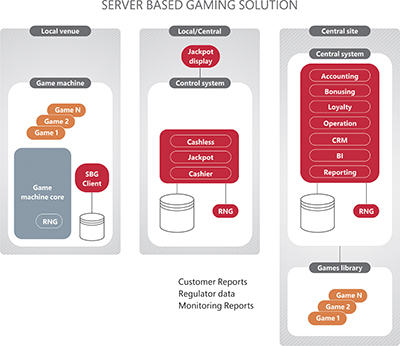The evolution of server-based gaming.

SERVER-based gaming looked set to revolutionise the industry when it first appeared a few years back. However, there has been no revolution, merely a relatively slow evolution, even though the technology has received a huge boost due to the rise in the popularity of VLTs in various parts of the world. Initially, the main advantage perceived by operators was that games could be updated at will, online, leading to a dramatic reduction in machine changes. Since then it has been seen that such systems also offer other vital benefits such as excellent data capture. The one thing that appears to be holding everyone back is a lack of standardisation. SBG is not really any use to an operator if it can only be applied to one manufacturer’s machines. This situation, however, now seems to be changing for the better. “Server-based gaming has established itself in all types of gaming operations - traditional casinos and all types of distributed gaming environments,” said Aleš Gornjec, general manager at Comtrade Gaming. He believes that standard protocols are now vital to the sector. “In the past, the most recent were often served with single vendor solutions. The trend here is to establish open systems that can connect any type of terminals from any machine manufacturer. “The prerequisite for that is of course some standardisation of connectivity and the Gaming Standards Association protocols now required in most new markets that regulate new VLT-type operations. “Some regulators already require central player protection functionality that can monitor spend limits and other potentially addictive behaviour across all machines within their state.” On the subject of slow operator uptake of SBG solutions, Gornjec said: “There are several reasons for slow adoption in certain regions. In the US, server-based technology didn’t bring enough benefits for casinos to invest and replace their machines just after having made the switch to cashless technology.
Read the full article in the August issue of InterGaming

